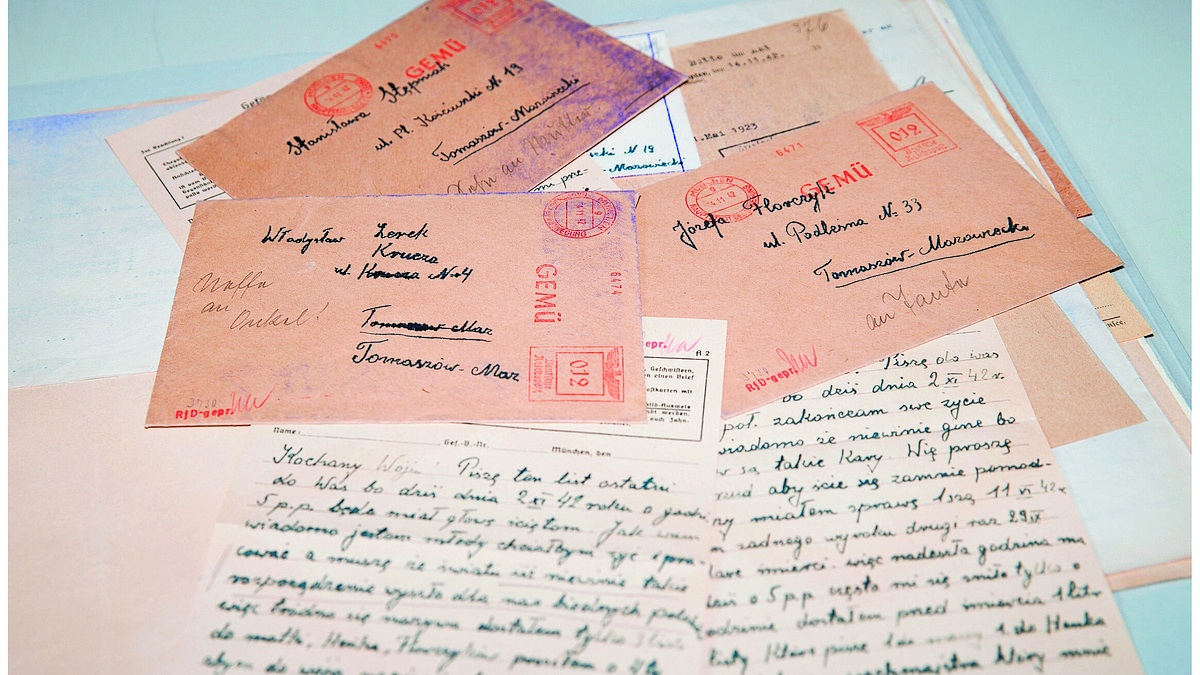Undelivered letters written by Nazi death row victims have been discovered after 80 years.
More than 50 messages penned by men and women who were put to death at the notorious Stadelheim prison in Munich were found in the Bavarian state archives.
Although most condemned inmates wrote to their families, two French prisoners chose to pen a virulent message of defiance to the Nazi authorities.
René Blondel and Victor Douillet appeared to write to the director of Stadelheim, telling him: ‘You can send this letter to Hitler and tell him: all the French s*** on you.’
The start of the letter is not clearly legible, it either says ‘Mr Director’, or – in a sign they could have been writing directly to Adolf Hitler – ‘Mr Dictator’.
Another was written by 19-year-old Jan Stepniak just minutes before he was guillotined.
He told his aunt and grandmother: ‘I am writing you one last letter, because today, on 2/11/42 at 5 in the afternoon, my life will come to an end.
‘As you know, I will meet death an innocent man, because this is just the way we Poles are punished.’
More than 50 letters that feature in 844 ‘execution files’ held in the Bavarian state archives have been identified and digitised.
Between 1933 and 1945, more than 1,000 executions were carried out at Stadelheim. For most killings, the guillotine was used.
Among the most high-profile inmates executed at Stadelheim were Hans and Sophie Scholl, the brother and sister who led the White Rose resistance movement.
Many of the condemned came from the likes of Poland, France and Czechoslovakia, all of which suffered terribly under Nazi occupation.
Another unearthed letter was written by Johannes Fleischmann, who was handed a death sentence in November 1941 after being accused of crimes including burglary.
He wrote to his mother: ‘When the judgment is enforced, I will be able to say with a clear conscience: I am the alleged thief, but the court is the murderer.’
Another victim, Maria Ehrlich, had just turned 81 when she was put to death in 1944. She was sentenced for ‘subversion of the armed forces’ in October 1943.
She wrote in one of four letters: ‘Dear Wenger! I am writing to you my final letter. In three hours I will be dead.
‘I am grateful for my life. I believe that my death will benefit my fatherland and my home city.
‘I have helped many people, so all that is left is to stand before God.
‘Finally: Yesterday, February 9, was my 81st birthday. It has been my turn to go for some time.
‘Many kisses, and greetings to everyone – especially the children. Your Marie.’
The Bavarian authorities are now working with experts at the Arolsen Archives, which specialises in documenting Nazi crimes, to find the families of the people the condemned addressed their letters to.
Floriane Azoulay, the director of Arolsen, said: ‘People on death row tended to use their final hours to say goodbye to loved ones.
‘Our mandate today is to find the addressees of the letters and the relatives in order to fulfill the last wishes of the unjustly condemned and to right this historical wrong.
‘This can be of incredible importance for the families.’
Bernhard Grau, director general of the Bavarian State Archives, said: ‘The Nazi past will not let us rest!
Giving the victims of the regime of injustice a name and a voice is more important than ever.
‘We are delighted to have found a partner in the Arolsen Archives who allows adding more information to the source material in our archives and so helps track down any living descendants of the victims.’
